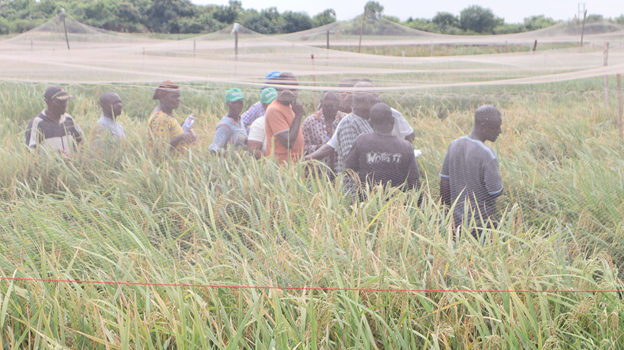FARMERS IN GHANA’S IRRIGATION SCHEMES PREFER NEW AROMATIC RICE DEVELOPED BY CSIR-CROPS RESEARCH INSTITUTE

On Thursday, 6th July, 2023, the CSIR-Crops Research Institute organized a field day at Dawhenya in the Ningo-Prampram district of Ghana for farmers, millers, and scheme managers from Dawhenya, Ashiaman, Aveyime, and Kpong Irrigation schemes to assess the field performance and milled grain of twelve (12) rice varieties. The varieties comprised newly released ones such as CRI-Enapa, CRI-Dartey, CRI-Kantinka, Legon 1 (Ex baika), CRI-Onuapa, CRI-KoreaMo, CRI-Agyapa, ISRIZ-6 and ISRIZ-7 as well as existing (relatively older) varieties like CRI-Amankwatia, CRI-AgraRice and Jasmine 85. All the varieties were developed and released in Ghana, with the exception of ISRIZ-6 and ISRIZ-7 which were released in Senegal.

The field day was part of activities under the KOPIA-Ghana Center funded project which aims at providing superior rice varieites and certfied seeds to farmers.
After touring the field, community-based focus group discussions led by Dr. Maxwell Darko Asante, Principal Investigator for the project and Deputy Director of the CSIR-Crops Research Institute were conducted. Different varieties were preferred by the different communities. However, CRI Agyapa, was overwhemingly selected by all the different communities as one of their most preferred varieties. The participants indicated that their choice of “CRI-Agyapa” was due to its attributes such as—high yield, good number of productive tillers, dense and good-looking panicles, early maturity, good taste, high level aroma, translucent grains as well as high head rice recovery.
CRI-Agyapa was also selected by farmers in the Anum Valley Irrigation Scheme, Nobewan during a field demonstration earlier in the year.
Other varieties selected by the stakeholders included CRI-Kantinka, CRI-Amankwatia, CRI-AgraRice, Jasmine 85, CRI-Enapa, CRI-Dartey, CRI-KoreaMo and Legon 1. The participants attributed their selection of these varieties to their good grain milling properties, aroma, dense and long panicles, high yield, and long grain.

Feedback from Participants
At the end of the field day, participants were very appreciative of the whole exercise. Representatives of the various stakeholder groups gave their feedback on the exercise.
Madam Margaret Yevu, a farmer from Aveyime, said the program had been very educative for them. She expressed her heartfelt gratitude to the organizers and requested that the field days be organized regularly.
Mr. Richard Martey Afleh, the leader of the farmers’ group at the Dawhenya Irrigation Scheme, added that the programme was a very good one and that it would help farmers choose varieties to plant for the next planting season. He further stated that the new varieties were very good for them because they have long grains-a preferred trait by the Ghanaian market. He said, “CRI–Agyapa is a very promising variety because it has all the good traits farmers and consumers want, which are aroma, long grain, early maturing, good milling quality, high yielding and good panicles”.

Madam Catherine Norvi Sogbadzi, a miller and aggregator from Asutuare stated how impressed she was with the excellent quality of the milled grains as well as the appearance of the improved varieties and indicated how easy it would be to sell them. “The varieties here today, possess all the attributes preferred by the Ghanaian rice market so selling them will not be difficult at all. They will be better options in place of some of the previous varieties that get broken when milled”, she stated. She then pleaded with the private sector to invest in rice production by providing state-of-the-art rice mills so that farmers can meet the demand of consumers.

Mr. Emmanuel Volsuuri from the Asian African Consortium (AAC), a subsidary of the Jospong Group of Companies, a new private sector player in the Ghanain rice industry, stressed the significance of the programme to the rice value chain and revealed the AAC’s intention of setting up mechanization centers in every district. He further indicated that tractors, power tillers, transplanters, combine harvesters and ultra-modern rice milling machines would be available for hiring at these centers. “I believe strongly that the mechanization centers will go a long way to mitigate some of the challenges faced by most actors in the rice value chain in the country. We also plan on setting up seed production units that will supply farmers with good quality seeds”, he stressed.

The Rice Desk Officer of the Ministry of Food and Agriculture (MOFA), Mr. Alhassan Imoro, encouraged farmers to adopt the improved varieties and use good quality seeds for planting. He also emphasized the necessity of such field days in contributing to Ghana’s efforts at attaining rice self-sufficiency.
Small packs of CRI-Agyapa and CRI-KoreaMo were given to farmers to plant in their fields.
Dr. Kim, the Director of KOPIA Ghana Center described the program as very successful.
Dr. Maxwell Darko Asante expressed his gratitude to the participants for attending the field day. He also thanked the Korean government for sponsoring the work through the KOPIA Ghana Center.
Authors: Elizabeth Norkor Nartey, Dr. Maxwell Darko Asante, Bernard Sakyiamah, Enoch Bobie-Agyemang
